- Home
- Jennifer Donnelly
A Northern Light Page 15
A Northern Light Read online
Page 15
And so I closed my eyes and all I knew was his nearness. And all I wanted was my own story and no one else's.
And so I said nothing. Nothing at all.
glean
"Lou, stop."
"'...then comes Junior in a baby carriage "I said stop...'"
"'...sucking his thumb, wetting his pants, doin' the hula-hula dance..."'
"Lou!"
"You're blushing, Matt! You're sweet on Royal Loomis! I know you are!"
"Nobody's sweet on anybody. And stop saying so."
Lou started singing her stupid song again, but then something appeared up ahead of us on the road that interested her far more than tormenting me did. An automobile. It could only be some well-heeled tourist driving it, or Mr. Sperry, or Miss Wilcox. No one else could afford one. The driver saw us and leaned on the horn. The car veered across the road, directly toward us. I grabbed the back of Lou's coveralls and pulled her into the grass.
"Let go, Matt," she whined. "I want to see it."
The driver pulled up and cut the engine. It was our teacher. She tossed the cigarette she'd been smoking and removed her goggles. "Hello, Mattie! Lou!" she bellowed, her cheeks pink. She wore a tan cluster, gloves, and a flowered silk scarf over her hair.
"Hello, Miss Wilcox," we said together.
"Where are you two off to?"
"We're on our way home from Burnap's. Pleasant, our mule, cracked his bit. We had to get it repaired," I explained.
"I see. I, myself, have been for a drive. Up to Beaver River and back. First one since the fall. The roads are finally dry enough to allow it. It's beautiful up there! Such freedom! I'm famished now, though. Driving always gives me an appetite. Why don't you two hop in? We'll go back to my house and have some lunch."
I was frightened of Miss Wilcox's automobile. "I think we'd best get home, ma'am," I said. "Our pa will be looking for us. He needs the bit."
"Oh, come on, Matt! Pa won't mind," Lou pleaded.
"I'll tell you what ... come for lunch and then I'll drive you home. It'll save some time."
"Pleeeeeease, Matt?" Lou begged.
"I guess it's all right," I said, more for Miss Wilcox's sake than Lou's. For all her giddy, breathless excitement, she seemed a little bit lonely. And I was curious, too. I had never seen the inside of my teacher's house. She had such nice clothes and jewelry, and a real automobile, so there was no telling what she might have at home.
Miss Wilcox got out, crank in hand, and started the engine again. It coughed and sputtered, finally caught, then fired off what sounded like cannon shot. I jumped out of my skin. Miss Wilcox laughed at me. Miss Wilcox laughed a lot. I knew she was wealthy, and wondered if money made everything funny.
"Hear that, Matt?" Lou whispered, giggling. "Just like Pa in the outhouse!"
"Shut up, Lou!" I hissed, hoping Miss Wilcox hadn't heard. "Go get in the back." She did, but not before she'd stooped down, quick as a weasel, and picked up the remains of Miss Wilcox's cigarette. I put my hand out for it, but she shoved it in her pocket and stuck her chin out at me.
When we were seated, Miss Wilcox engaged the gears and we were off. "It's a nice car, isn't it?" she shouted, turning toward me. "Brand-new. I had a Packard before. When I lived in New York. But a Ford's better for the country."
I nodded and kept my eyes straight ahead. One of us had to.
"It's wonderful here in the woods," Miss Wilcox said, swerving to avoid a squirrel. "Such freedom! You can do whatever you like and no one minds."
No, but how they talk! I thought.
Glean, my word of the day that day, is a good word. It is old and small, not showy. It has a simple meaning—to gather after the reapers—and then meanings inside the meanings, like images in a prism. It is a farming word, but it fits people other than farmers. Aunt Josie never bent her back in a field one day in her life, but she is a gleaner. She combs other people's leavings—hints, hearsay, dropped words—looking for nuggets of information, trying to gather enough bits together to make a whole story.
Miss Wilcox drove us out of Eagle Bay and a mile and a half up the road to Inlet. The old Foster camp on Fourth Lake is a two-story log house with a stone foundation. Dr. Foster was a retired bachelor doctor from Watertown who loved the North Woods and built himself a large camp here. The word camp means different things to different people. To Pa and Lawton, it means a lean-to. To city people, it means a real house with all the comforts but tricked out like a cabin. Aunt Josie once told me that Mr. John Pierpont Morgan has crystal champagne glasses in his camp on Lake Mohegan, and a Steinway piano and telephones in every room and a dozen servants, too. And Mr. Alfred G. Vanderbilt has solid-gold taps on his bathroom sink at the Sagamore. Dr. Foster is dead now. His sister inherited the house and rents it out. Usually only in the summer and to big families with enough children and grandparents and aunts and uncles to fill up all the rooms and crowd the porch, but my teacher had been living in it all year and had it entirely to herself.
Miss Wilcox pulled into the driveway, which curves around in back of the house in a horseshoe shape, and then we went inside. The camp has a real doorbell and Lou asked if she could ring it, then kept doing it until I pulled her away. It was cool and dark inside and smelled like oil soap. There were carpets everywhere and wainscoring halfway up the walls and velvet curtains thick and heavy enough to shut out the whole world. There were pictures of deer and trout on the walls, and mirrors in frames, and pretty blue-and-white plates. It was very beautiful, but most of all, it was quiet. So quiet you could hear a clock ticking from two rooms away, and boards creaking under your feet, and your own thoughts inside your head. It was never that quiet in our house.
Miss Wilcox led us out of the entry past rooms that looked as if no one ever stepped into them, filled with furniture that looked as if no one ever sat on it, to an enormous, spotless white kitchen that looked like no one ever cooked in it. There, she set about fixing us dainty little sandwiches with the crusts cut off, and tiny iced cakes from a box, and tea. I tried to help, but she wouldn't let me.
"Don't no one else live here, Miss Wilcox?" Lou asked looking all around at the spotless stove and the shining floor and the painted cabinets with no fingerprints on them, or broken knobs.
"Lou...," I said, cautioning her.
"No, Lou. Just me. And it's doesn't. Doesn't anyone else five here."
Lou digested this, then said, "Were you bad, Miss Wilcox?"
Miss Wilcox's knife clattered to the counter. She turned to look at my sister. "'Bad'?" she said. "Lou, how ... why do you ask that?"
"When I was bad, my mamma used to make me sit in the parlor by myself. For an hour. With the door closed. It was awful. Are you being punished? Is that why you have to live here all alone?"
Miss Wilcox's hand fluttered to her throat. Her fingers twined themselves in the circlet of amber beads there. "I like living alone, Lou," she said. "I like the quiet and the solitude. I have a lot of reading to do, you see. And lessons to prepare during the school year."
Lou nodded, but she didn't look convinced. "If you ever get lonely, we could bring Barney by. Our dog. He could keep you company. He has gas, but he's still a nice dog. He wouldn't pee on the settee or anything. He don't see well enough to find it—"
"Lou!" I hissed.
"What? Oh, jeezum ... doesn't. Doesn't. Doesn't. Doesn't. He doesn't see well enough."
I could see Miss Wilcox was trying not to laugh, but I didn't find it funny. Not one bit. Lou knows better than to ask personal questions or talk about Barney's gas. She knows what good manners are. Mamma taught her same as she taught all of us. Lou is hungry for attention, though. Any kind. She and Pa used to be inseparable, but now he looks right through her. Through all of us. I know it hurts her, so I try not to be cross, but sometimes she goes too far.
"Shall we take our lunch into the library?" Miss Wilcox asked, her eyes moving from me to Lou and back again.
"Where? On the pickle boat?" Lou asked, looking confused.
/>
I didn't scold her for that because I was wondering the same thing.
This time Miss Wilcox did laugh. "No, right here in the house. Come on."
She put the lunch on a tray, along with some plates and napkins, then led us out of the kitchen, down a different hallway, and through a set of tall pocket doors.
What I saw next stopped me dead in my tracks. Books. Not just one or two dozen, but hundreds of them. In crates. In piles on the floor. In bookcases that stretched from floor to ceiling and lined the entire room. I turned around and around in a slow circle, feeling as if I'd just stumbled into Ali Baba's cave. I was breathless, close to tears, and positively dizzy with greed.
"Won't you sit down and have your lunch, Mattie?" Miss Wilcox asked.
But eating was the last thing on my mind. And I didn't see how Miss Wilcox could eat, or teach, or sleep, or ever find any reason to leave this room. Not with all these books in it, just begging to be read.
"Are these all Dr. Foster's books?" I whispered.
"No, they're mine. I had them sent up from the city. They're in a bit of a shambles. I never seem to get around to arranging them properly."
"There are so many, Miss Wilcox."
She laughed. "Not really. I think you and Weaver have read half of them already."
But I hadn't. There were dozens of names I didn't know. Eliot. Zola. Whitman. Wilde. Yeats. Sand. Dickinson. Goethe. And all those were in just one stack! There were lives in those books, and deaths. Families and friends and lovers and enemies. Joy and despair, jealousy, envy, madness, and rage. All there. I reached out and touched the cover of one called The Earth. I could almost hear the characters inside, murmuring and jostling, impatient for me to open the cover and let them out.
"You can borrow anything you like, Mattie," I heard Miss Wilcox say. "Mattie?"
I realized I was being rude, so I made myself stop staring at the books and looked at the rest of the room. There was a large fireplace with two settees in front of it, facing each other across a low table. Lou sat on one of them, stuffing herself with sandwiches and slurping her tea. There was a writing table under a window, with pens and pencils and a stack of good paper. I touched the top sheet. It felt like satin. A few more sheets, covered with handwriting all in lines like a poem, were spread haphazardly across the tabletop. Miss Wilcox came over and shuffled them into a pile.
"I'm sorry," I said, suddenly remembering myself. "I didn't mean to pry."
"That's all right. It's just a lot of scribbling. Won't you eat something?"
I sat down and took a sandwich, and to make conversation, Miss Wilcox said she saw me riding the other day with a tall and handsome boy.
"That's Royal Loomis. Mattie's sweet on him," Lou said.
"No, I'm not," I said quickly. I was, of course. I was as dopey as a calf for him, but I didn't want my teacher to know. I wasn't sure she understood about amber eyes or strong arms or kisses in a boat, and I thought she might be disappointed in me for being swayed by those sorts of things.
Miss Wilcox raised an eyebrow.
"I'm not. I don't like any of the boys around here."
"Why not?"
"I suppose it's hard to like anyone real after Captain Wentworth and Colonel Brandon," I said, trying my best to sound worldly wise. "Jane Austen ruins you for farm boys and loggers."
Miss Wilcox laughed. "Jane Austen ruins you for everything else, too," she said. "Do you like her books?"
"I like them some."
"Just 'some'? Why not a lot?"
"Well, ma'am, I think she lies."
Miss Wilcox put her teacup down. "Does she?"
"Yes, ma'am, she does."
"Why do you think that, Mattie?"
I was not used to my elders asking me what I think—not even Miss Wilcox—and it made me nervous. I had to collect myself before I answered her. "Well, it seems to me that there are books that tell stories, and then there are books that tell truths...," I began.
"Go on," she said.
"The first kind, they show you life like you want it to be. With villains getting what they deserve and the hero seeing what a fool he's been and marrying the heroine and happy endings and all that. Like Sense and Sensibility ox Persuasion. But the second kind, they show you life more like it is. Like in Huckleberry Finn where Huck's pa is a no-good drunk and Jim suffers so. The first kind makes you cheerful and contented, but the second kind shakes you up."
"People like happy endings, Mattie. They don't want to be shaken up."
"I guess not, ma'am. It's just that there are no Captain Wentworths, are there? But there are plenty of Pap Finns. And things go well for Anne Elliott in the end, but they don't go well for most people." My voice trembled as I spoke, as it did whenever I was angry. "I feel let down sometimes. The people in books—the heroes—they're always so ... heroic. And I try to be, but..."
"...you're not," Lou said, licking deviled ham off her fingers.
"...no, I'm not. People in books are good and noble and unselfish, and people aren't that way ... and I feel, well ... hornswoggled sometimes. By Jane Austen and Charles Dickens and Louisa May Alcott. Why do writers make things sugary when life isn't that way?" I asked too loudly. "Why don't they tell the truth? Why don't they tell how a pigpen looks after the sow's eaten her children? Or how it is for a girl when her baby won't come out? Or that cancer has a smell to it? All those books, Miss Wilcox," I said, pointing at a pile of them, "and I bet not one of them will tell you what cancer smells like. I can, though. It stinks. Like meat gone bad and dirty clothes and bog water all mixed together. Why doesn't anyone tell you that?"
No one spoke for a few seconds. I could hear the clock ticking and the sound of my own breathing. Then Lou quietly said, "Cripes, Mattie. You oughtn't to talk like that."
I realized then that Miss Wilcox had stopped smiling. Her eyes were fixed on me, and I was certain she'd decided I was morbid and dispiriting like Miss Parrish said and that I should leave then and there.
"I'm sorry, Miss Wilcox," I said, looking at the floor. "I don't mean to be coarse. I just ... I don't know why I should care what happens to people in a drawing room in London or Paris or anywhere else when no one in those places cares what happens to people in Eagle Bay."
Miss Wilcox's eyes were still fixed on me, only now they were shiny. Like they were the day I got my letter from Barnard. "Make them care, Mattie," she said softly. "And don't you ever be sorry."
She glanced at Lou, set the whole plate of cakes before her, then rose and beckoned me to her writing table. She picked up a glass paperweight shaped like an apple and took two books from under it. "Thérèse Raquin," she said solemnly, "and Tess of the D'Urbervilles. Best not tell anyone you have them." Then she took her writing paper out of its box, put the books in the box, covered them with a few sheets of paper, and handed the box to me.
I smiled, thinking that my teacher sure was dramatic. "Cripes, Miss Wilcox, they're not guns," I said.
"No, they're not, Mattie, they're books. And a hundred times more dangerous." She stole another glance at Lou, then asked me, "Has there been any progress?"
"No, ma'am. And there's not likely to be."
"Would you consider working for me, then? I need help with my library, as you can see. I'd like you to come and arrange my books. Sort them into nonfiction and fiction, and then sort fiction into novels, plays, short stories, and poetry, and shelve them alphabetically. I'll pay you. A dollar each time."
It was only the first week of May. If I worked for Miss Wilcox one day a week throughout the summer, I'd have sixteen dollars or so by the time September came. Enough for a train ticket and then some. I wanted to say yes so badly, but then I heard Royal asking me why I was always reading about other people's lives, and felt his lips on mine. I heard my aunt telling me to get down off my high horse and Pa saying I didn't need to go to Miss Wilcox's to find work, there was plenty for me at my own house. And I heard my mamma, asking me to make a promise.
"I can't, Miss
Wilcox," I said. "I can't get away."
"Surely you can, Mattie. Just for an hour or two. I'll drive you home. Come this Saturday."
I shook my head. "I've got the chickens to do. The coop needs whitewashing and Pa said he wants it done by Sunday."
"I'll do it, Matt," Lou said. "Me and Abby and Beth. Pa won't know. He'll be out plowing. He won't raise Cain, long as the work gets done."
I looked at my sister, who wasn't supposed to be listening. I saw the crumbs around her mouth, the lank hair hanging in her face, the dirty cuffs of Lawton's coveralls slopping down over her boots. I saw her blue eyes big and hopeful, and I loved her so much I had to look away.
"If you come, you can borrow anything you like, Mattie. Anything at all," Miss Wilcox said.
I imagined myself here on a Saturday afternoon, in this calm, quiet room, digging among all these books, gleaning my own treasures.
And then I smiled and said yes.
de • his • cence
It was seven o'clock on a May evening. It was after the supper was cooked and served, the dishes washed, the pots scrubbed, dried, and put away, the stove wiped down, the coals banked, the floor mopped, the dishrags put to soaking, and Barney fed. Lou and Beth were polishing their boots. Abby was sitting in front of the fire with a heap of darning. Pa was sitting across from her, mending Pleasant's bridle. And me? I was standing in the middle of the kitchen, looking at my family, each one of them close enough to touch, my heart pounding so hard I thought it would burst.
There were more chores to do. The wood box next to the stove was nearly empty. There were ashes to dump down the outhouse and Abby could have used my help with the darning, but I felt as if the very walls themselves were pressing in upon me. As if I would go crazy if I stayed in this prison of a kitchen for one second longer. I leaned against the sink and closed my eyes. I must have sighed or groaned or something, because Abby suddenly said, "What's wrong, Mattie?"

 Rogue Wave
Rogue Wave Waterfire Saga, Book One: Deep Blue (A Waterfire Saga Novel)
Waterfire Saga, Book One: Deep Blue (A Waterfire Saga Novel)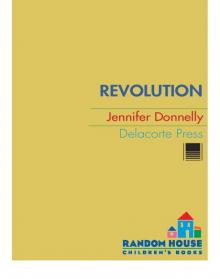 Revolution
Revolution The Wild Rose
The Wild Rose Waterfire Saga (4 Book Series)
Waterfire Saga (4 Book Series)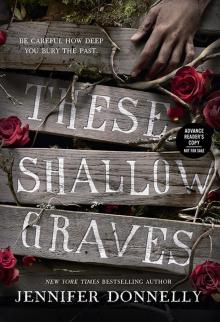 These Shallow Graves
These Shallow Graves Beauty and the Beast: Lost in a Book
Beauty and the Beast: Lost in a Book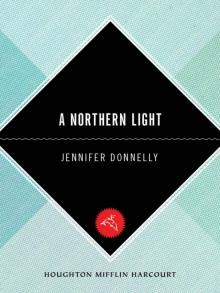 A Northern Light
A Northern Light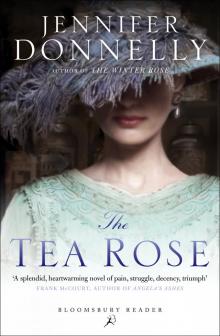 The Tea Rose
The Tea Rose Waterfire Saga, Book Three: Dark Tide: A Deep Blue Novel
Waterfire Saga, Book Three: Dark Tide: A Deep Blue Novel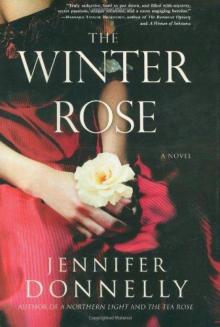 The Winter Rose
The Winter Rose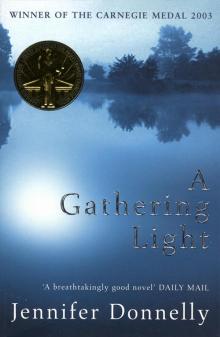 A Gathering Light
A Gathering Light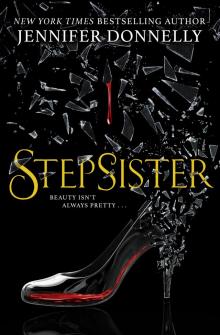 Stepsister
Stepsister Waterfire Saga, Book Four: Sea Spell: Deep Blue Novel, A
Waterfire Saga, Book Four: Sea Spell: Deep Blue Novel, A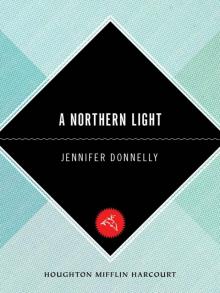 Northern Light
Northern Light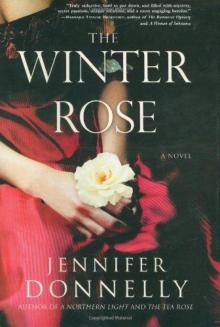 Winter Rose, The
Winter Rose, The